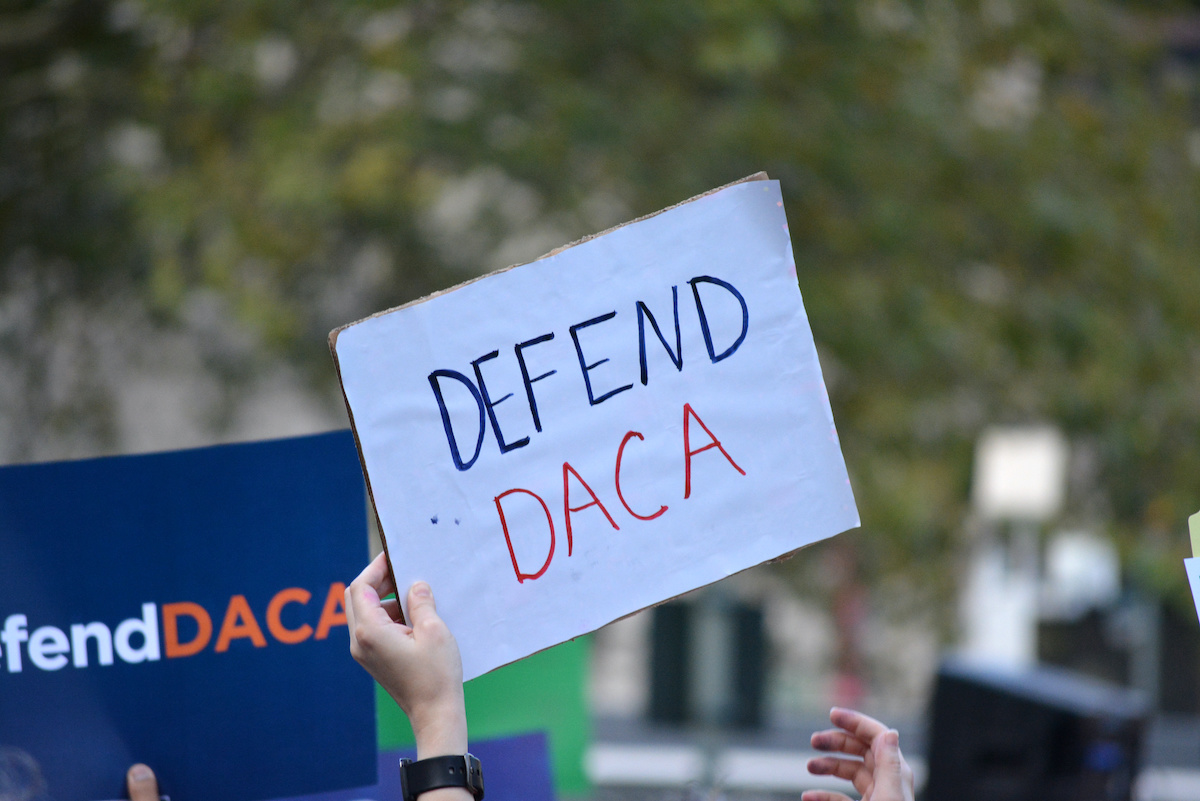
WASHINGTON (GA Recorder) — June 15 marked the 11th anniversary of a program that was created during the Obama administration to temporarily protect undocumented children from deportation.
But congressional inaction and legal challenges have led to more than a decade of limbo for the 600,000 people enrolled, with no end in sight. They are often called “Dreamers,” based on never-passed legislation in Congress called the Dream Act.
The Deferred Action for Childhood Arrivals program, which was meant to be a temporary stopgap, is now the only tool that protects those brought to the U.S. as children from deportation. A pending court case out of Texas will determine whether DACA is legal — and what happens next.
“It’s a little bit of a kick in the gut,” Salma Vizcaino Garcia, a 25-year-old DACA recipient who lives in Ellenwood, Georgia, said of the court case.
Vizcaino Garcia, who is preparing to apply to medical school, said she and many DACA recipients aren’t hopeful about the outcome of the Texas case. She said she’s focusing her efforts on advocacy and educating people about the program.
She said she hopes that through collective action, enough people will urge state and federal lawmakers to create a permanent pathway to citizenship.
“I genuinely am of the opinion, if I was able to talk to every person that was against us, that I could change their minds,” she said. “We’re just regular people. We’re just trying to live our lives.”
Stalled in Congress
For more than two decades, Congress has tried and failed to pass immigration reform.
With the current divided Congress, the only recent bipartisan piece of legislation is from six U.S. House lawmakers called the Dignity Act. The bill doesn’t specifically address DACA recipients but is aimed at creating a legal pathway to citizenship for the estimated more than 11 million undocumented people in the country.
If the bill manages to clear the House on a bipartisan vote, it would still need to reach the 60-vote threshold in the Senate. The last time Congress passed major immigration legislation was during the Reagan administration in 1986.
A case in Texas threatens the legality of the DACA program, prompting immigration advocates and attorneys to lobby the Biden administration to exert its authority to use Deferred Enforced Departure, which is not a specific immigration status, but allows those covered to be exempt from deportation for a certain period of time.
The Texas challenge is likely to reach the Supreme Court, which has a conservative majority. A decision likely would come in the spring of 2024 or later.
President Joe Biden issued a DACA statement on Thursday urging Congress to act.
“While Vice President Harris and I will continue fighting to pass legislation to protect Dreamers and create a path to citizenship, only Congress can provide permanent and lasting stability for these young people and their families,” Biden said. “Congress must act to protect our Dreamers.”
On Thursday evening, the White House is hosting a screening with DACA recipients and immigration advocates of the movie “Flamin’ Hot,” a directorial debut from Latina actress Eva Longoria that tells the legendary origin story of “Flamin’ Hot Cheetos,” a popular snack in the Latino community. The L.A. Times has debunked the tale, but it’s still a popular rags-to-riches story.
“The Biden-Harris administration continues its effort to lift up and engage the Latino community by showcasing their stories and celebrating their contributions to our country,” White House press secretary Karine Jean-Pierre said on Wednesday during a press briefing.
‘Unknowns and uncertainty’
Jaime Rangel was part of the first wave of DACA applicants when the program was created. There was a lot of apprehension about applying, but eventually, he submitted his high school transcript and went through a background check to enroll.
“There was just a lot of unknowns and uncertainty, but we went for it because it provided me an opportunity to have some lawful presence in the country,” Rangel said. “It was better than being in the shadows.”
Rangel, who is the regional government relations director for a pro-immigration lobbying group called FWD.us, argues that DACA recipients are in every industry across the U.S., and the nation would feel the effect of an immediate loss of hundreds of thousands of employees.
In his home state of Georgia, there are about 20,000 DACA recipients who contribute $100 million in state and local taxes. DACA recipients contribute more than $1.2 billion a year in federal, state, and local taxes, according to the Institute on Taxation and Economic Policy, a nonpartisan tax policy organization.
A DACA recipient for more than a decade, Rangel is now 32 and married to another DACA recipient. They have a 3-year-old son.
“It’s great that we can celebrate 11 years, as DACA recipients, of celebrating our contributions to this country, celebrating all that we have achieved in 11 years. But at the same time, we cannot just stick to celebrating on a program that’s ultimately is going to end and go away,” he said of the Texas court case. “We need Congress to act.”
The closest Congress came to bipartisan immigration reform was in 2013, when the “Gang of Eight,” made up of four Republican and four Democratic senators, crafted a bill that would create a pathway to citizenship for millions of undocumented people. It cleared the Senate, but Republican House Speaker John Boehner never brought it to the floor for a vote.
Despite the fight to keep DACA in place, many immigration policy experts have called the program outdated because there are now thousands of undocumented youth who are not eligible for the program, some because they were not even born yet. To qualify, an undocumented youth needs to have continuingly resided in the U.S. since 2007.
“Congress’ continued inaction has led to multiple court challenges to DACA, which put DACA recipients and DACA-eligible youth in limbo,” Juliana Macedo do Nascimento, the deputy director of federal advocacy for United We Dream, said in a statement.
United We Dream is one of the largest youth immigrant-led advocacy groups.
Macedo do Nascimento said that because the program is outdated, it’s led to more than 100,000 undocumented high school graduates who will not be able to qualify for DACA.
Texas case
The same federal judge who ruled in 2021 that the program the Obama administration created was illegal — preventing any new applications — continues to preside over the case.
It’s estimated that there are 95,000 applicants that are blocked due to a judge’s order blocking new applicants from being accepted, according to U.S. Citizenship and Immigration Services data.
In addition, it’s estimated that there are 400,000 eligible undocumented youth who are unable to meet DACA eligibility requirements because they came to the U.S. too recently, according to FWD.us research.
U.S. District Judge Andrew Hanen initially determined that the program was illegal because the Obama administration failed to follow proper rulemaking procedures when it created the program in 2012 through a memorandum.
The Department of Justice appealed the case, and the 5th U.S. Circuit Court of Appeals in New Orleans sided with Hanen. But because the Biden administration was putting forth a new DACA regulation to replace the Obama-era memo that was set to go into effect in October, the appeals court decided that the case should be returned to Hanen.
Hanen, on June 1, heard oral arguments about whether the Biden administration’s new rule, which is nearly identical to the memo creating DACA, is lawful.
The Obama-era memo is being challenged by nine Republican-led states that argue the White House overreached in creating a program that should have been left to Congress. Those nine states also argue that under the Biden administration, they were harmed financially by incurring costs for DACA recipients’ health care and education.
Those states are Alabama, Arkansas, Kansas, Louisiana, Mississippi, Nebraska, South Carolina, Texas, and West Virginia.
This Texas case is not the first time the DACA program has been challenged. In 2017, the Trump administration also tried to end the program. Three years later, the Supreme Court ruled in a 5-4 decision that the White House inappropriately ended DACA, keeping it in place.






